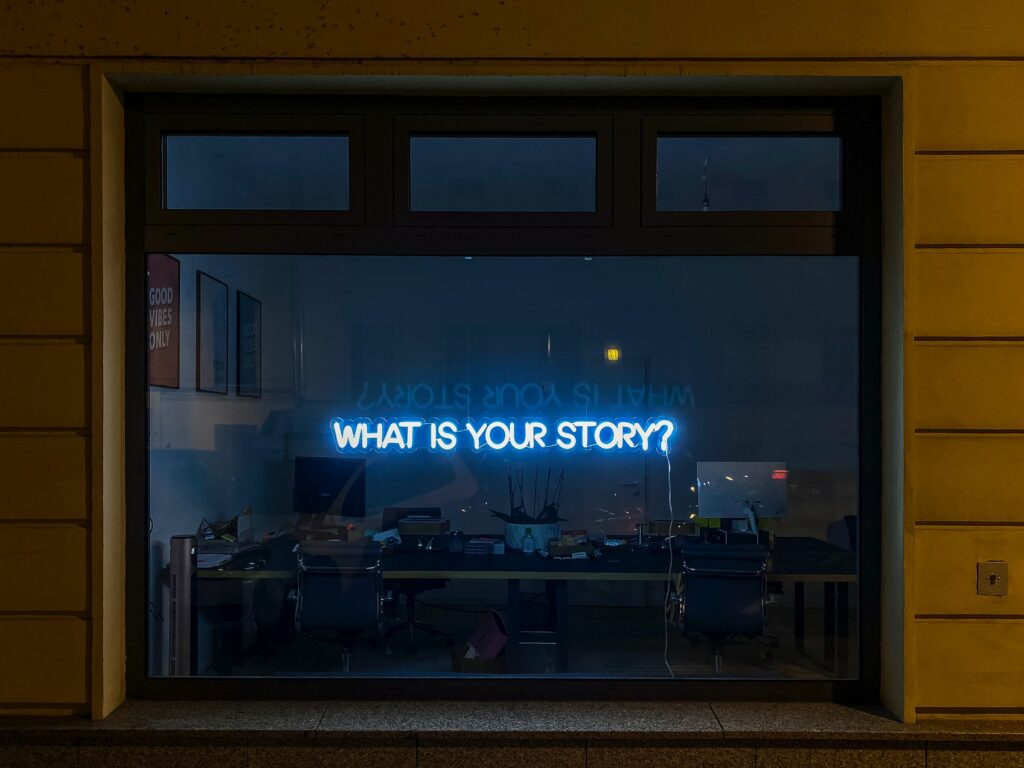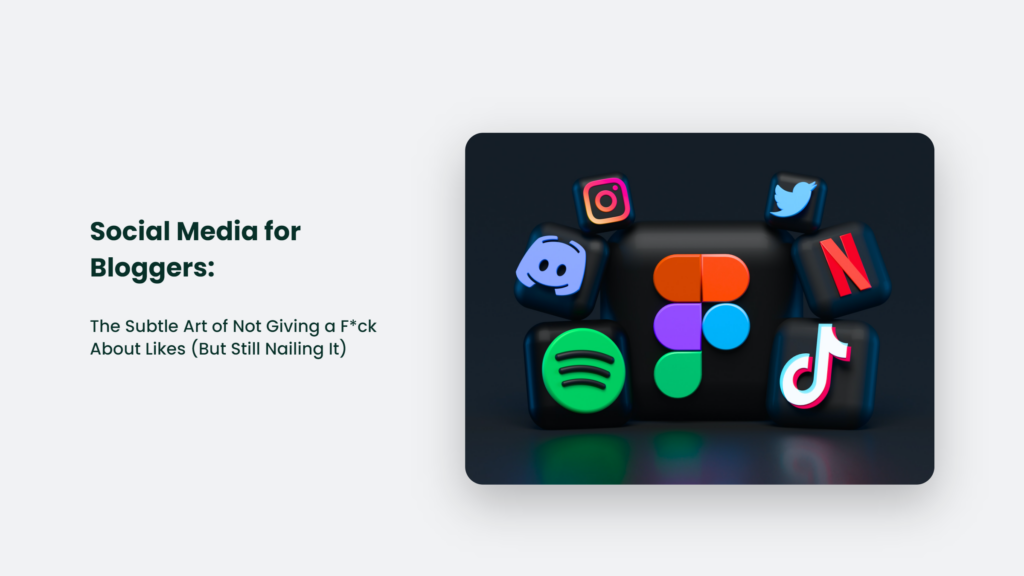

Social Media for Bloggers: The Subtle Art of Not Giving a F*ck About Likes (But Still Nailing It)

As Seen On
So, you’re a blogger, right? You write words, create content, and probably think, “Social media for bloggers? Why would I give a flying duck about it? I’m a wordsmith, not an Insta-bimbo!”
Well, hold onto your typewriter, Ernest Hemingway, because I’m about to drop a truth bomb: you need social media. And not just because everyone and their dog (literally) has an Instagram account, but because it’s the most powerful tool you’re probably underutilizing.

Social Media: The Good, The Bad, and The Ugly
Let’s kick things off by acknowledging the elephant in the room: social media can be a real pain in the ass. There are the vanity metrics, the trolls, and the endless scrolling. But here’s the thing. Despite its flaws, social media is the digital equivalent of a global coffee shop where everyone hangs out.
According to Datareportal’s 2023 statistics, 4.48 billion people use social media. That’s more than half the global population! And guess what? They’re not just there to stalk their ex or watch cat videos. They’re there to consume content. Your content.
But hey, don’t just take my word for it. Let’s bring in the big guns. As the late, great David Bowie once said, “Tomorrow belongs to those who can hear it coming.” So, let’s start listening.
Harnessing the Power of Social Media: “The Road Less Traveled”
So, how can you, an intellectual blogger, harness the power of social media without selling your soul or your sanity? The answer is simple: not giving a f*ck about the wrong things.
I’m not saying you should completely disregard your follower count or likes, but think about it: do you want a million followers who don’t care about your content or a thousand engaged followers who hang onto your every word and share your posts with their friends?
That was a rhetorical question, by the way. If you chose the million, I can’t help you. And neither can anyone else.
Now, let’s break down some nifty ways to make social media work for you without losing your mind.
Choose Your Platform Wisely
Think about where your audience hangs out. If you’re blogging about professional development, LinkedIn is your playground. If you’re all about travel or fashion, Instagram and Pinterest are your allies. Pick and focus on one or two that make sense for your niche. Don’t spread yourself too thin trying to conquer all platforms.
Engage with Your Audience
Social media is about being, well, social. Respond to comments, ask questions, and participate in discussions. Create a community, not just a follower count.
Share Valuable Content
Remember, it’s not about you; it’s about your audience. What do they want to see? What problems can you solve for them? It isn’t Field of Dreams, folks. If you build it, they might come… but only if ‘it’ is worth their time.

Social Media for Bloggers:
Here’s a list of social media platforms that can be beneficial for bloggers, along with some reasons why they might be useful:
Facebook:
As one of the largest social networks, Facebook is an excellent platform for bloggers. You can create a dedicated page for your blog to share your latest posts and behind-the-scenes content and engage with your readers. Facebook Groups are also an invaluable resource. By joining groups relevant to your niche, you can interact with like-minded individuals, share your expertise, and subtly promote your blog.
Twitter:
Twitter is perfect for sharing bite-sized information, engaging in discussions, and sharing links to your blog posts. Twitter chats are a great way to connect with others in your niche, and hashtags can help your content get discovered. Moreover, it’s a fantastic platform for keeping up with trends and news you can react to or comment on in your blog.
LinkedIn:
It is the go-to platform for professional and business-oriented content. If your blog is centred around a specific industry, professional development, or business tips, LinkedIn is a great place to share your posts. You can establish yourself as an industry expert by contributing thoughtful articles and participating in discussions.
Instagram:
Instagram is a visually-driven platform. Regular posts, engaging stories, and reels can give your blog a personality. Utilizing relevant hashtags can help new readers discover your content. Also, the ‘Swipe Up’ feature in Instagram Stories is a great way to drive traffic directly to your blog posts. If your blog is in a niche like fashion, food, travel, or lifestyle, this is where you want to be.
Pinterest:
Don’t underestimate Pinterest. It’s a powerful search engine for visual content. Creating attractive pins that link back to your blog posts can drive significant traffic to your blog. The key is to create visually appealing pins that resonate with your target audience. Pinterest also provides longevity to your content as pins can continue to drive traffic to your blog for months or even years.
YouTube:
If you have the resources to create video content, YouTube is a platform you should consider. You can create video versions of your blog posts, behind-the-scenes videos, or tutorials related to your niche. Video content is highly engaging and can help you reach an audience that prefers watching over reading. Plus, embedding videos in your blog posts can increase users’ time on your site, improving your SEO.
Reddit:
Reddit comprises countless ‘subreddits’ or communities based on specific interests. If you can find subreddits that align with your blog’s niche, you can become an active member of these communities. However, Reddit users generally frown upon blatant self-promotion, so focus on providing valuable contributions and only sharing your blog when relevant and helpful.
Quora:
This Q&A platform is an excellent place to establish yourself as an authority in your niche. By providing valuable, in-depth answers to questions related to your blog’s focus, you can drive highly targeted traffic to your site. It’s also a great platform for finding content ideas based on people’s questions.
Medium:
Medium is an online publishing platform where anyone can share their thoughts and ideas. You can republish your blog posts here to reach a wider audience. Medium has its internal distribution system, which can expose your content to more people, even if they don’t follow you.
Remember, the best platform for you depends on your target audience, the type of content you produce, and your personal preferences. It’s more beneficial to be active and engaged on a few platforms than to have a presence on all platforms but not have the time or resources to manage them effectively. Start with one or two, see how it goes, and expand your presence as needed.
Learning to Juggle: Balancing Blogging and Social Media
“But Mark,” you’re probably saying, “I’m a blogger, not a social media manager! How am I supposed to do all this?”
Well, my friend, it’s all about balance. And just like any good diet, it’s all about portion control. Here are some tips:
Schedule Your Posts: There are a ton of tools out there that can help you schedule posts in advance. This way, you can dedicate a chunk of time each week to create and schedule your posts and then let the tool do the rest of the work. Automation is your friend here.
Cross-Promote Your Content: Got a new blog post? Share it on your social media. Got a great discussion happening on your Facebook page? Write a blog post about it. Cross-promotion helps you get more bang for your buck.
Set Boundaries:
- Don’t let social media consume your life.
- Dedicate specific times for managing your social media, and stick to them.
- Don’t be that person who checks Instagram at 3 am.
Frequently Asked Questions:
How often should I post on social media?
It depends on the platform, your audience, and your content. Start with once a day and adjust as necessary.
What type of content should I share?
Share content that is valuable to your audience. This could be blog posts, tips, industry news, inspirational quotes, or behind-the-scenes peeks into your life.
Should I pay for social media ads?
It depends on your goals and budget. Social media ads can be a great way to reach a larger audience, but they’re not necessary for success. Start by building an organic following and then consider ads if they make sense for your strategy.
How do I deal with negative comments or trolls?
The block and mute buttons are your friends. Don’t feed the trolls. Remember, you can’t please everyone, and that’s okay.
The Bottom Line:
So there you have it, folks. The lowdown on social media for bloggers. Now, go forth and conquer the digital world. Just remember to keep it real and don’t give a f*ck about the wrong things.
Gracie Jones
Up until working with Casey, we had only had poor to mediocre experiences outsourcing work to agencies. Casey & the team at CJ&CO are the exception to the rule.
Communication was beyond great, his understanding of our vision was phenomenal, and instead of needing babysitting like the other agencies we worked with, he was not only completely dependable but also gave us sound suggestions on how to get better results, at the risk of us not needing him for the initial job we requested (absolute gem).
This has truly been the first time we worked with someone outside of our business that quickly grasped our vision, and that I could completely forget about and would still deliver above expectations.
I honestly can’t wait to work in many more projects together!
Disclaimer
*The information this blog provides is for general informational purposes only and is not intended as financial or professional advice. The information may not reflect current developments and may be changed or updated without notice. Any opinions expressed on this blog are the author’s own and do not necessarily reflect the views of the author’s employer or any other organization. You should not act or rely on any information contained in this blog without first seeking the advice of a professional. No representation or warranty, express or implied, is made as to the accuracy or completeness of the information contained in this blog. The author and affiliated parties assume no liability for any errors or omissions.

